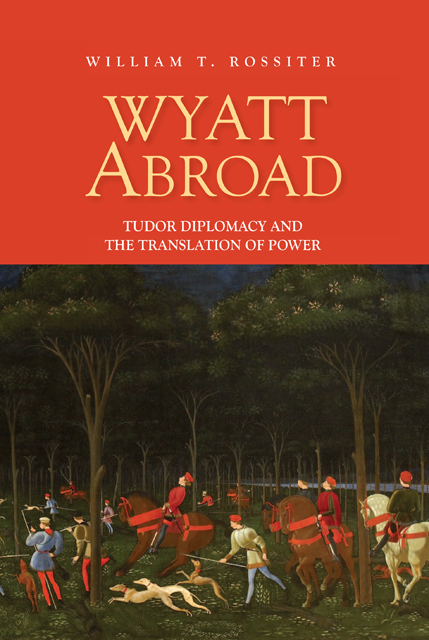Book contents
- Frontmatter
- Contents
- List of Illustrations
- Acknowledgements
- Note on Editions Used
- Abbreviations
- Introduction: The First Reformer?
- Chapter 1 ‘Sovendra du chaseur’: Wyatt in France, French at the English court
- Chapter 2 ‘My galy charged’: Wyatt in Italy
- Chapter 3 ‘So feble is the threde’: Wyatt in Spayne
- Chapter 4 ‘Inward Sion’: Wyatt in Jerusalem – The Penitential Psalms and Soteriological Diplomacy
- Conclusion: ‘In Kent and Christendome’: Wyatt in England
- Glossary of Rhetorical and Literary Terms
- Bibliography
- Index
Conclusion: ‘In Kent and Christendome’: Wyatt in England
Published online by Cambridge University Press: 23 February 2023
- Frontmatter
- Contents
- List of Illustrations
- Acknowledgements
- Note on Editions Used
- Abbreviations
- Introduction: The First Reformer?
- Chapter 1 ‘Sovendra du chaseur’: Wyatt in France, French at the English court
- Chapter 2 ‘My galy charged’: Wyatt in Italy
- Chapter 3 ‘So feble is the threde’: Wyatt in Spayne
- Chapter 4 ‘Inward Sion’: Wyatt in Jerusalem – The Penitential Psalms and Soteriological Diplomacy
- Conclusion: ‘In Kent and Christendome’: Wyatt in England
- Glossary of Rhetorical and Literary Terms
- Bibliography
- Index
Summary
The focus of this study has been Wyatt’s translations and their diverse points of correspondence with his service to Henry VIII in the major European centres of power. Wyatt’s translations themselves are equally diverse, ontologically speaking, as we have seen. For example, Wyatt’s translation of the French poetic tradition is characterized by thematic equivalence and the use of analogues as points of departure. Wyatt’s translations of Petrarch are frequently predicated upon the pre-existing late medieval model of triadic translation, wherein the new work is born of the confluence of the auctour-text and its commentary. This triangulation is developed into a more elaborate practice of imitatio in the Penitential Psalms, in which a plurality of commentaries and prior translations are blended into a unity unlike them all, consonant with the Petrarchan model of imitation.
However, these diverse forms of translation and imitation do not guarantee success with their target audience or their success as poems. A translation succeeds only insofar as it naturalizes its source, rendering it palatable to its implied, imagined or ideal readership. To use a contemporary term, Wyatt English’d his continental models by modulating them in the poetic voice he had developed through his reading of English poetry. Wyatt’s target culture was the audience or readership responsive to the poetics of the English tradition, but who also desired new fangilnes.
New Fangilnes?
English poetry in the 1520s was configured by Chaucer. Commentators such as John Watkins and James Simpson have already provided persuasive and erudite illustrations of the Henrician Chaucer, so that is not ground which needs covering again here. Some brief facts will suffice. Wyatt’s Chaucer was Pynson’s and Thynne’s, and incorporated the Chaucerian apocrypha, which included works by Lydgate and Usk, amongst others. An illustration of this fact can be provided by the word(s) ‘new fangilnes’ in Wyatt’s most famous poem.
The term, like reform, is oriented towards novelty. When we read it in ‘They fle from me’ (XXXVII) it appears almost to constitute a neologism by association; the nature of the signified effectively blinds us to the familiarity of the signifier. Fanglement denotes ‘something fashioned, an invention, a contrivance’ (OED), and as such corresponds with the theme of self-fashioning in Wyatt’s poetry, a process which Greenblatt associates with Renaissance modernity.
- Type
- Chapter
- Information
- Wyatt AbroadTudor Diplomacy and the Translation of Power, pp. 198 - 224Publisher: Boydell & BrewerPrint publication year: 2014



